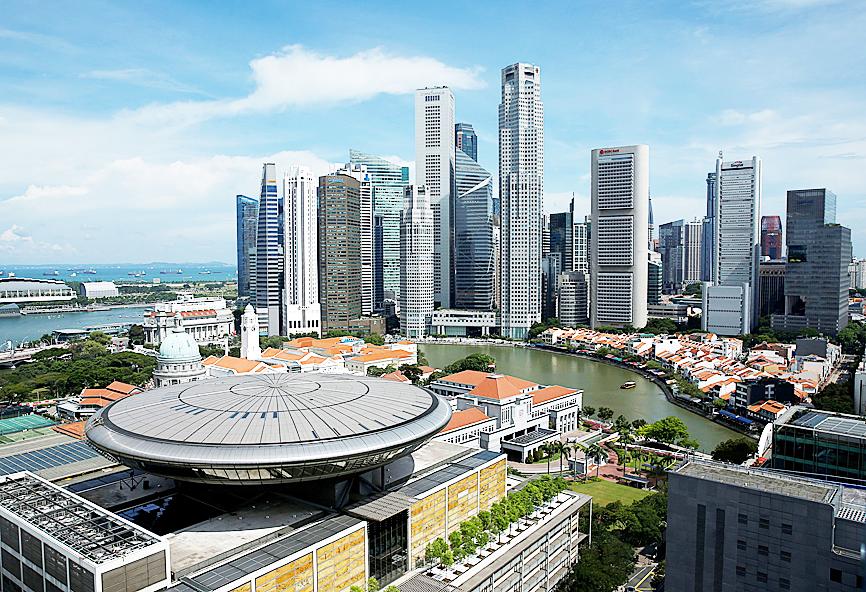Australia granted “major project status” to an ambitious A$22 billion (US$15.8 billion) plan to export power from a giant solar farm in the country’s north to Southeast Asia via undersea cable.
The status recognizes the “strategic significance” of the project, which is expected to inject billions of dollars into the economy and create thousands of jobs, Australian Minister for Energy and Emissions Reduction Angus Taylor said in a statement yesterday.
The Australia-ASEAN Power Link envisions connecting the world’s largest solar farm and battery system in Australia’s Northern Territory to Singapore and Indonesia via a 3,700km undersea cable.

Photo: Reuters
Similar proposals for long-haul, transnational power shipments have been pursued in other regions, including from North Africa to Europe, and from Mongolia to Japan and South Korea.
The high-profile boost by the Australian government contrasts with the relatively muted interest from Singapore, which is expected to be its main customer.
The city-state’s Energy Market Authority in November last year acknowledged that it had met with the project’s developer, Sun Cable Pty Ltd, but has shown little public appetite in the venture.
The authority did not immediately respond to a request for comment yesterday.
Sun Cable has said that the project could supply one-fifth of Singapore’s power needs, helping to reduce its reliance on imports.
The project, which is backed by Atlassian cofounder Mike Cannon-Brookes and Fortescue Metals Group founder Andrew Forrest, plans to start marine survey work from August.
Sun Cable is targeting commercial operations to begin in 2027.
The major project status provides the Sun Cable project with government support that includes a single entry point for national approvals, and assistance with state and territory approvals.

A magnitude 7.0 earthquake struck off Yilan at 11:05pm yesterday, the Central Weather Administration (CWA) said. The epicenter was located at sea, about 32.3km east of Yilan County Hall, at a depth of 72.8km, CWA data showed There were no immediate reports of damage. The intensity of the quake, which gauges the actual effect of a seismic event, measured 4 in Yilan County area on Taiwan’s seven-tier intensity scale, the data showed. It measured 4 in other parts of eastern, northern and central Taiwan as well as Tainan, and 3 in Kaohsiung and Pingtung County, and 2 in Lienchiang and Penghu counties and 1

A car bomb killed a senior Russian general in southern Moscow yesterday morning, the latest high-profile army figure to be blown up in a blast that came just hours after Russian and Ukrainian delegates held separate talks in Miami on a plan to end the war. Kyiv has not commented on the incident, but Russian investigators said they were probing whether the blast was “linked” to “Ukrainian special forces.” The attack was similar to other assassinations of generals and pro-war figures that have either been claimed, or are widely believed to have been orchestrated, by Ukraine. Russian Lieutenant General Fanil Sarvarov, 56, head

FOREIGN INTERFERENCE: Beijing would likely intensify public opinion warfare in next year’s local elections to prevent Lai from getting re-elected, the ‘Yomiuri Shimbun’ said Internal documents from a Chinese artificial intelligence (AI) company indicated that China has been using the technology to intervene in foreign elections, including propaganda targeting Taiwan’s local elections next year and presidential elections in 2028, a Japanese newspaper reported yesterday. The Institute of National Security of Vanderbilt University obtained nearly 400 pages of documents from GoLaxy, a company with ties to the Chinese government, and found evidence that it had apparently deployed sophisticated, AI-driven propaganda campaigns in Hong Kong and Taiwan to shape public opinion, the Yomiuri Shimbun reported. GoLaxy provides insights, situation analysis and public opinion-shaping technology by conducting network surveillance

‘POLITICAL GAME’: DPP lawmakers said the motion would not meet the legislative threshold needed, and accused the KMT and the TPP of trivializing the Constitution The Legislative Yuan yesterday approved a motion to initiate impeachment proceedings against President William Lai (賴清德), saying he had undermined Taiwan’s constitutional order and democracy. The motion was approved 61-50 by lawmakers from the main opposition Chinese Nationalist Party (KMT) and the smaller Taiwan People’s Party (TPP), who together hold a legislative majority. Under the motion, a roll call vote for impeachment would be held on May 19 next year, after various hearings are held and Lai is given the chance to defend himself. The move came after Lai on Monday last week did not promulgate an amendment passed by the legislature that